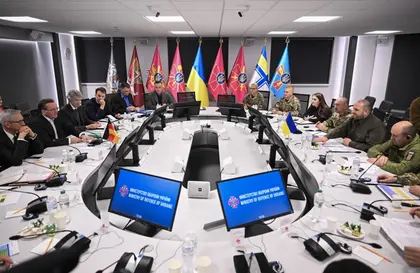The 17th meeting of the Ukraine Defense Contact Group (UDCG), held online on Nov. 22, saw agreement on a new ground-based air defense coalition to be set up under the leadership of Germany and France, as well as new aid packages for Ukraine.
The Ramstein format unites more than 50 countries of the world and was set up with the aim of providing collective support to meet Ukraine’s defense needs following Russia’s full-scale invasion.
JOIN US ON TELEGRAM
Follow our coverage of the war on the @Kyivpost_official.
Ukraine’s Defense Minister, Rustem Umerov, summarized the main results of the meeting via his Telegram channel:
“Following the results of the visit of Germany’s minister of defense, aid for $1.4 billion has already been announced – this includes IRIS-T systems with guided missiles, 8,000 new anti-tank mines, one set of the Patriot system, and additional 155-mm artillery ammunition – everything should be received by mid-December.”
Umerov also confirmed the following:
- The Netherlands has prepared EUR 2 billion for military aid to Ukraine.
- Estonia, which leads the IT coalition, is providing half a million dollars in funding for IT coalition activities in addition to Luxembourg's EUR 10 million commitment.
- The UK and Norway will look at how to strengthen security in the Black Sea as part of a maritime coalition.
- Work will continue on the Interoperability Roadmap – a path to NATO.
On the latter point, the minister of defense said: “Together with my colleagues in Brussels, we are continuing work on the Interoperability Roadmap. I spoke with Lloyd Austin in Kyiv two days ago about the need for Ukraine to move further into NATO. The Ukrainian army must meet all NATO criteria. We must change for full interoperability with our partners.”
Umerov thanked international partners for their on-going support for Ukraine, saying “each ammunition provided to Ukraine is an opportunity to destroy the enemy's stronghold.”

Ukrainian Navy Brings Down Kh-59 Missile with Ship-Mounted VAMPIRE SAM
The minister invited colleagues from partner countries to pay official visits to Ukraine “to see firsthand that their aid provided is being used effectively and is bringing the day of our victory closer.”
He added: “Ukraine's victory will be a clear signal for dictatorships. This is a signal that the crime of aggression will be punished.”
Meanwhile, Kyiv is working on creating a powerful military-industrial complex and involving its international partners in the process.
Commander-in-Chief of the Armed Forces of Ukraine (AFU), Valerii Zaluzhnyi, joined the Ramstein format for the first time at this week’s virtual meeting. Afterwards, he provided the following update on Facebook:
“Informed our partners in detail about the situation on the battlefield. Noted that the situation at the front is complicated, but under control. The [AFU] continues to conduct defensive and offensive operations. Reported on the actions of the Russians, threats and their probable plans for the near future.”
Oher representatives from Ukraine joining the 17th meeting included Kyrylo Budanov, chief of the Main Directorate of Intelligence of the Ministry of Defense of Ukraine; representatives of the Defense Ministry, the AFU; as well as the deputy heads of the President's Office, Roman Mashovets and Andriy Sybiga.
In his evening address on Nov. 22, President Volodymyr Zelensky summarized key outcomes from the meeting:
“There are new packages of support for Ukraine – for our warriors. These include shells and missiles, electronic warfare and drones, new capacities for our air defense... I am grateful to every country that participates in these efforts, which enable our cities and villages to be more protected from Russian attacks. Not everything can be said publicly yet, but Ukraine's sky shield is getting more powerful literally every month.”
Zelensky did not directly take part in the latest Ramstein format discussion, but previously attended the October meeting at NATO headquarters in Brussels.
Earlier this week, German Defense Minister Boris Pistorius paid an unannounced visit to Kyiv “to make a personal impression of the current situation and the effectiveness of German support.”
Following the meeting, Germany’s Ministry of Defense revealed the content of a new aid package for Ukraine worth $1.3 billion.
You can also highlight the text and press Ctrl + Enter










